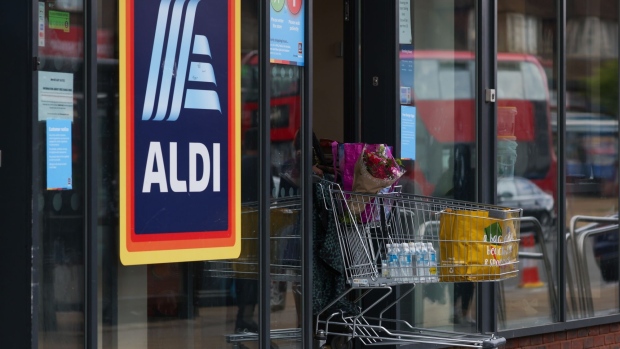Jan 31, 2023
More Brits Turn to Aldi and Lidl as Food Inflation Hits Record High
, Bloomberg News

(Bloomberg) -- Inflation on British groceries jumped to another record high in January with little sign of price rises slowing on consumers’ weekly shop.
The rate hit 16.7% in the four weeks to Jan. 22, up from 14.4% in December, reaching the highest level since Kantar started tracking the data in 2008. The increase adds an extra £788 ($973) to shoppers’ annual spend on groceries.
German discounter Aldi was the fastest-growing grocer for the fourth month in a row with sales rising almost 27% from a year earlier. Lidl was close behind with an increase of around 24%.
Overall UK inflation may be starting to ease from the worst levels in more than four decades, but food prices are stubbornly going up and up and that’s causing tensions between supermarkets and their suppliers. Shoppers are visiting discount supermarkets, buying own-label goods and putting fewer items in their baskets to try to cope with the rising cost of food.
“Late last year, we saw the rate of grocery price inflation dip slightly, but that small sign of relief for consumers has been short-lived,” said Fraser McKevitt, head of retail and consumer insight at Kantar.
Deeply Concerning
Shoppers relied on supermarket own-label goods with sales rising 9.3% compared with just a 1% increase in branded alternatives. Tesco Plc chairman John Allan hit a nerve when he said earlier this month that some food producers are profiteering from the higher inflation.
“These latest figures are deeply concerning,” said Sue Davies, head of food policy at consumer magazine Which. “Some households are already skipping meals to make ends meet.”
The magazine published a report earlier this month saying shoppers’ trust in supermarkets is declining and grocers should do more to help consumers through the cost-of-living crisis.
The UK’s antitrust regulator said Tuesday that it has started a review into the pricing of groceries, studying how much goods cost by weight or volume. Suppliers sometimes reduce the size of a product while keeping its price the same, a move known as “shrinkflation” which risks angering some customers.
Meanwhile, the Kantar data also showed shoppers adopting the so-called Veganuary trend with supermarket sales of own-brand vegan or plant-based options growing by 21%. Consumers following “dry January” meant that volumes of no- and low-alcohol beer rose 3% on last year.
(Updates with reference to watchdog review in 10th paragraph.)
©2023 Bloomberg L.P.


